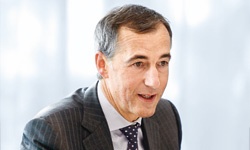Group investments

“We continue to focus on a high-quality, sustainable investment performance.”
Guido Fürer
Group Chief Investment Officer
Strategy
During 2015 Swiss Re continued to maintain a balanced asset allocation with a steady allocation to government bonds and cash. We selectively added corporate bonds and loans across multiple currencies to further diversify our credit portfolio. We also significantly expanded our real estate allocation by 0.7% after a reduction in equity and hedge fund exposures during 2014.
Financial markets overview
During the first half of 2015, equity prices held up well while government bond yields moved higher and credit spreads widened driven by heavy supply. The risk of Greece leaving the Eurozone resulted in significant market nervousness around mid-year. Additionally, the surprise change in the Chinese exchange rate regime in August, amid already growing concern about economic slowdown, significantly influenced market sentiment and pushed equity market volatility to its highest level since the Eurozone crisis began in 2011. Sentiment subsequently recovered in the final quarter of the year.
The 2015 market movements occurred against a backdrop of improving economic growth across developed economies, albeit with weaker external demand from the emerging economies. Labour markets in the US and UK have become increasingly tight as unemployment rates approach the natural rate, as evidenced by rising wages in the closing stages of the year. However, pass-through to headline inflation has been exceptionally low as commodity price weakness has continued to weigh on prices. Heading into 2016 these base effects may reverse and inflation could steadily rise again. Markets ended 2015 with strong expectations that the ultra-accommodative monetary policy in the US was coming to an end.
3.4
Net investment income
in USD billion, 2015 (2014: USD 4.1 billion)
3.5%
Group return on investments
2015 (2014: 3.7%)
Investment result
The Group’s investment portfolio, excluding unit-linked and with-profit investments, decreased to USD 116.8 billion at the end of 2015, compared to USD 125.4 billion at the end of 2014. The decrease was due to the impact of rising interest rates, net asset outflows and foreign exchange translation.
The return on investments for 2015 was 3.5%, compared to 3.7% in 2014, with the decrease mainly attributable to lower net investment income from equity-accounted investments.
The Group’s non-participating net investment income decreased to USD 3.4 billion in 2015 compared to USD 4.1 billion in 2014, largely driven by net asset outflows, reducing the size of the fixed income portfolio, as well as lower earnings from equity-accounted positions. The Group’s fixed income running yield of 3.0% was lower than 3.3% for 2014, driven by recent net purchases in a lower yield environment, net outflows of higher yielding assets and a lower impact from extraordinary paydowns.
The Group reported non-participating net realised investment gains of USD 1.2 billion in 2015, mainly as a result of gains from sales of fixed income and equity securities, as well as gains on insurance-related items. The result was significantly higher than USD 567 million in 2014, which was impacted by the unwinding of an asset-funding structure in Life & Health Reinsurance and the sale of Aurora in Admin Re®.
The total return on investments was flat in 2015, reflecting the impact of rising interest rates and credit spread widening over the year.
Outlook
Overall, the outlook for 2016 is one of moderate growth, but financial market risks remain skewed to the downside. Central bank policy divergence will remain a key theme as the US and UK are expected to begin raising policy rates, while the European Central Bank (ECB) and Bank of Japan (BoJ) are expected to extend their quantitative easing programmes. The US Federal Reserve (US Fed) and Bank of England (BoE) have emphasised that the path of rate increases will be very gradual, as inflationary pressure will remain fairly muted and will occur against the backdrop of steadily slowing emerging market economies (including China). The UK has the additional headwind of the referendum on its membership in the EU. Depending on the outcome, this could remain a key theme for the UK and Europe over the coming years.
Against this backdrop, the Group will seek to maintain a balanced and high-quality investment portfolio. The acquisition of Guardian Financial Services is expected to increase the Group’s overall allocation to credit by approximately 6%, consistent with the change in Admin Re®’s investment portfolio and business mix. The quality of the credit portfolio remains high.